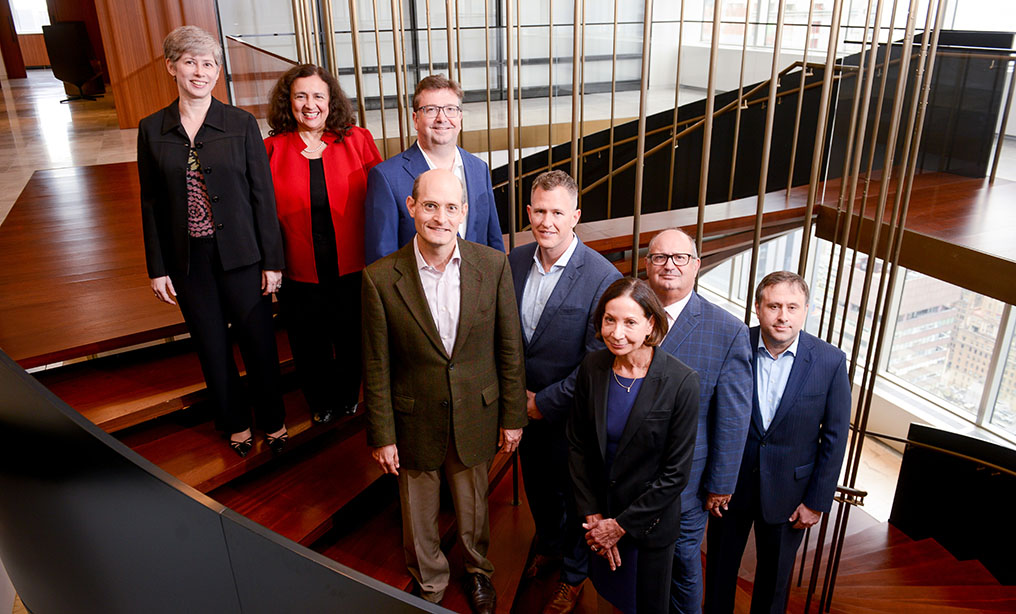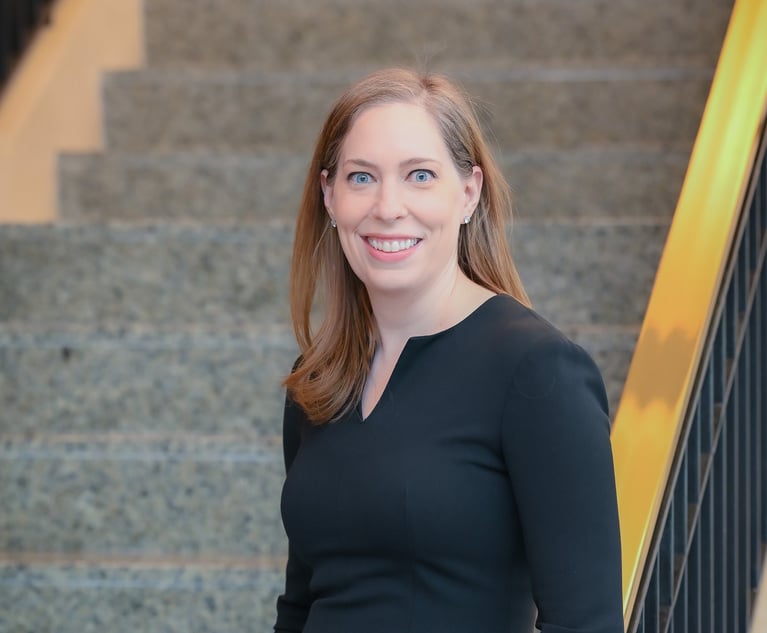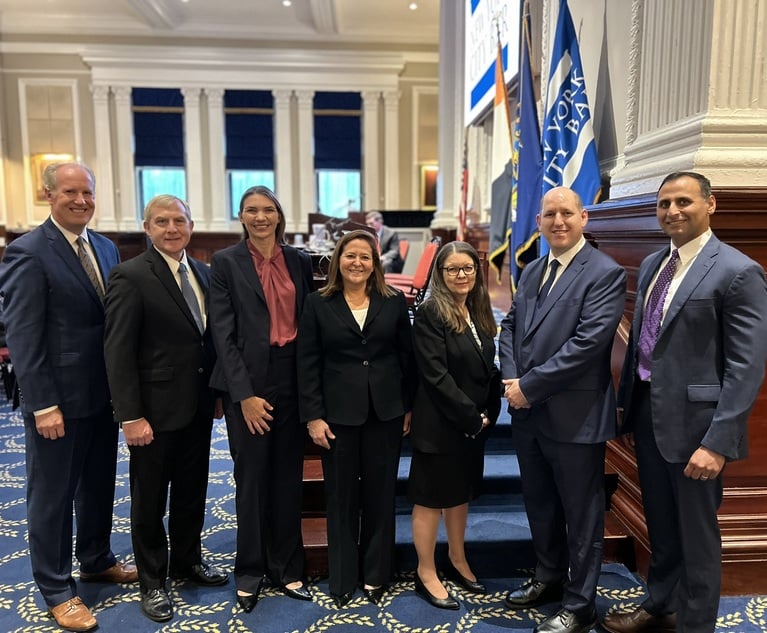Litigation Department of the Year, Intellectual Property: Kirkland & Ellis
Our attorneys are prepared to be second and first chair trial attorneys well in advance of their peers from other firms.
October 16, 2019 at 11:05 AM
5 minute read
 From left, partners Claudia Ray, Dale Cendali, Robert Appleby, Greg Arovas, Joseph Loy, Patricia Carson, Thomas Fleming and James Marina (Photo by David Handschuh/NYLJ)
From left, partners Claudia Ray, Dale Cendali, Robert Appleby, Greg Arovas, Joseph Loy, Patricia Carson, Thomas Fleming and James Marina (Photo by David Handschuh/NYLJ)
What are some of the department's most satisfying successes of the past year and why? Patricia (Pat) Carson: One of the most satisfying things about Kirkland's IP practice is the broad range of matters we handle for an incredible group of clients. Highlights from the last year include a jury trial win in trade secret litigation on behalf of biotech company Flexus and its founders; a victory in a precedent-setting copyright fair use case for Fox News; obtaining a precedential opinion in a copyright case for Nike; a summary judgment win for AT&T; securing a critical motion for a major electronics client in a nine-patent case; successful resolutions of three cases before the ITC; and involvement in four appeals to the Supreme Court. We are also incredibly proud of our pro bono work. We successfully represented a New York-area musician in a trademark dispute with a competitor who misappropriated and unlawfully obtained a federal trademark registration to his stage name. The team continues its successful work on behalf of asylum seekers, veterans, and the LGBTQIA+ community, among others.
Joseph (Joe) Loy: Kirkland lawyers thrive in the courtroom. One particularly satisfying success this past year involved defeating a preliminary injunction following an evidentiary hearing during which a more junior teammate got to cross examine an expert forensic witness—her first. While the win was satisfying, observing my teammate dismantle the witness was even more so. It also reaffirmed that our deep-rooted culture of on-your-feet training pays dividends.
A prospective client in crisis calls and asks why your team should be retained. What is your answer? Pat: We strive to ensure that our clients avoid crises, to the extent possible. But when a crisis arrives, that is when we demonstrate our unparalleled value. We work together as a team, drawing on our vast firm resources to map out and implement the best plan of action. Our focus is always on the client's needs and the best way to proceed to achieve their business goals.
What traits do you respect most in opposing firms and lawyers? Pat: Honesty and integrity. When dealing with opposing counsel I want to feel comfortable that if we agree on something, the agreement will be honored. Game playing is highly inefficient and only leads to increased expense for the clients on both sides and bad blood between opposing counsel.
Joe: Willingness to concede a point is appreciated. Great lawyers don't fight every battle or argue every point. Our clients may not see eye-to-eye, but being honest about your positions can help resolve disputes more quickly and efficiently.
What sorts of trends are you seeing in litigation, and what do you think will be the most important development in the law/legal business that will impact your field in the next 10 years? Pat: A significant trend and probably what will be the most important development impacting life sciences IP litigation is the growing trend to protect information through trade secrets instead of patents. Trade secret protection is particularly important to companies seeking to protect brand-name biologics against biosimilar competition.
The life sciences industry has been particularly hard hit by the current state of the law regarding patent eligibility. Groundbreaking discoveries such as a non-invasive method to diagnose certain fetal characteristics for pregnant women have been declared patent-ineligible. Efforts are underway to legislatively reform patent eligibility law and have the potential to significantly impact patent protection in the life sciences industry.
Joe: I have similarly seen a big uptick in trade secrets as an area of interest in IP protection. Whereas 10 years ago I had not a single trade secret case, today, half of my practice is dedicated to it. And it's not just litigation. Companies are seeking advice on how to ensure their trade secrets do not walk out the door, and how to protect themselves from allegations of trade secret misappropriation when onboarding employees.
What is the firm doing to ensure that future generations of litigators are ready to take the helm? Pat: Kirkland excels at training its lawyers to be trial lawyers. The Kirkland Institute of Trial Advocacy or "KITA," is a 2-3 day immersion exercise that has associates trying a case, including openings, live witness directs and crosses and closings. The result is that our attorneys are prepared to be second and first chair trial attorneys well in advance of their peers from other firms. Kirkland supports the development of its attorneys with programs ranging from KITA to women's and diversity networking events.
Joe: Kirkland has a long tradition of encouraging pro bono work, and such work often complements the extensive training programs we provide our litigators. In the past year alone, I have observed Kirkland associates taking witnesses during pro bono trials and arguing appeals as appointed counsel in federal court. These real-world lawyering experiences provide the training backbone for the next generation of Kirkland litigators.
Responses prepared by Patricia (Pat) Carson and Joseph (Joe) Loy, intellectual property partners at Kirkland & Ellis.
This content has been archived. It is available through our partners, LexisNexis® and Bloomberg Law.
To view this content, please continue to their sites.
Not a Lexis Subscriber?
Subscribe Now
Not a Bloomberg Law Subscriber?
Subscribe Now
NOT FOR REPRINT
© 2025 ALM Global, LLC, All Rights Reserved. Request academic re-use from www.copyright.com. All other uses, submit a request to [email protected]. For more information visit Asset & Logo Licensing.
You Might Like
View All
Elizabeth Cooper of Simpson Thacher on Building Teams in a 'Relationship Business'
4 minute read
For Paul Weiss, Progress Means 'Embracing the Uncomfortable Reality'
5 minute read
Kenneth Feinberg Had Dreams of Being on the Big Screen. His 9/11 Victims Fund Gave Him an Unexpected Star Turn

City Bar Holds 32nd Annual Henry L. Stimson Medal Presentation
Trending Stories
- 1Gunderson Dettmer Opens Atlanta Office With 3 Partners From Morris Manning
- 2Decision of the Day: Court Holds Accident with Post Driver Was 'Bizarre Occurrence,' Dismisses Action Brought Under Labor Law §240
- 3Judge Recommends Disbarment for Attorney Who Plotted to Hack Judge's Email, Phone
- 4Two Wilkinson Stekloff Associates Among Victims of DC Plane Crash
- 5Two More Victims Alleged in New Sean Combs Sex Trafficking Indictment
Who Got The Work
J. Brugh Lower of Gibbons has entered an appearance for industrial equipment supplier Devco Corporation in a pending trademark infringement lawsuit. The suit, accusing the defendant of selling knock-off Graco products, was filed Dec. 18 in New Jersey District Court by Rivkin Radler on behalf of Graco Inc. and Graco Minnesota. The case, assigned to U.S. District Judge Zahid N. Quraishi, is 3:24-cv-11294, Graco Inc. et al v. Devco Corporation.
Who Got The Work
Rebecca Maller-Stein and Kent A. Yalowitz of Arnold & Porter Kaye Scholer have entered their appearances for Hanaco Venture Capital and its executives, Lior Prosor and David Frankel, in a pending securities lawsuit. The action, filed on Dec. 24 in New York Southern District Court by Zell, Aron & Co. on behalf of Goldeneye Advisors, accuses the defendants of negligently and fraudulently managing the plaintiff's $1 million investment. The case, assigned to U.S. District Judge Vernon S. Broderick, is 1:24-cv-09918, Goldeneye Advisors, LLC v. Hanaco Venture Capital, Ltd. et al.
Who Got The Work
Attorneys from A&O Shearman has stepped in as defense counsel for Toronto-Dominion Bank and other defendants in a pending securities class action. The suit, filed Dec. 11 in New York Southern District Court by Bleichmar Fonti & Auld, accuses the defendants of concealing the bank's 'pervasive' deficiencies in regards to its compliance with the Bank Secrecy Act and the quality of its anti-money laundering controls. The case, assigned to U.S. District Judge Arun Subramanian, is 1:24-cv-09445, Gonzalez v. The Toronto-Dominion Bank et al.
Who Got The Work
Crown Castle International, a Pennsylvania company providing shared communications infrastructure, has turned to Luke D. Wolf of Gordon Rees Scully Mansukhani to fend off a pending breach-of-contract lawsuit. The court action, filed Nov. 25 in Michigan Eastern District Court by Hooper Hathaway PC on behalf of The Town Residences LLC, accuses Crown Castle of failing to transfer approximately $30,000 in utility payments from T-Mobile in breach of a roof-top lease and assignment agreement. The case, assigned to U.S. District Judge Susan K. Declercq, is 2:24-cv-13131, The Town Residences LLC v. T-Mobile US, Inc. et al.
Who Got The Work
Wilfred P. Coronato and Daniel M. Schwartz of McCarter & English have stepped in as defense counsel to Electrolux Home Products Inc. in a pending product liability lawsuit. The court action, filed Nov. 26 in New York Eastern District Court by Poulos Lopiccolo PC and Nagel Rice LLP on behalf of David Stern, alleges that the defendant's refrigerators’ drawers and shelving repeatedly break and fall apart within months after purchase. The case, assigned to U.S. District Judge Joan M. Azrack, is 2:24-cv-08204, Stern v. Electrolux Home Products, Inc.
Featured Firms
Law Offices of Gary Martin Hays & Associates, P.C.
(470) 294-1674
Law Offices of Mark E. Salomone
(857) 444-6468
Smith & Hassler
(713) 739-1250






